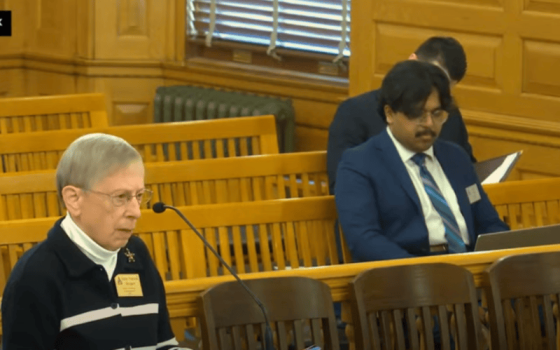
An asylum-seeking migrant family from Haiti cross the Rio Bravo to surrender to U.S Border Patrol agents to request asylum in El Paso, Texas, as seen from Ciudad Juarez, Mexico, April 22, 2022. (OSV News/Reuters/Jose Luis Gonzalez)
Whatever the outcome of America's Nov. 5 presidential election, migrant and refugee advocates are predicting a challenging environment, said participants in a Sept. 24 video conference tackling the topic of how election results may impact Central America and those who are migrating through the region or coming from there to reach the U.S.-Mexico border.
Regarding a Trump or Harris administration, "their policies can be very different, but they do have some similarities," said Aimée Santillán, an El Paso, Texas, born and raised policy analyst for the Hope Border Institute, or HOPE. "They seem to be policies to keep people out of asylum, in one way or another."
HOPE states that it "brings the perspective of Catholic social teaching to bear on the realities unique to our US-Mexico border region."
Former President Donald Trump, the Republican presidential nominee, has on several occasions vowed to implement the "largest domestic deportation operation in American history." He aims to end birthright citizenship and Temporary Protected Status, or TPS — which allows migrants to stay and work in the U.S. for up to 18 months, with renewal — and has also endorsed a refugee ban.
Vice President Kamala Harris, the Democratic presidential nominee, has proposed a higher standard for asylum eligibility, but hopes to increase employment-based visas by 13% and family-based visas by 7% through 2030.
"The Trump administration will identify the machinery for deportation," warned Santillán. "And more than the border, this goes to all of the immigrant communities in the United States — especially people who are not here in a legal way. What he has said is that the first executive actions are centered on eliminating asylum completely."
Santillán said she also expects family separations reminiscent of the "zero tolerance" approach taken at the U.S.-Mexico border from April to June 2018. Court documents indicate more than 5,000 children were separated from their parents; the parents of 180 children have not yet been found.
And while a Democrat-majority Congress might be willing to consider immigrant-friendly reforms, the issue of immigration seems set to remain a political cudgel.
"We have seen that there's an obsession on both sides of (Capitol) Hill with border security," said Santillán, "and to limit access to asylum — to reduce those who are coming to our borders."
Oscar Chacón, co-founder and senior strategy adviser at Alianza Américas — a network of Latin American and Caribbean migrant-led organizations — emphasized immigrant contributions.
"Immigration and immigrants that have come to the United States — especially in the last 15 years — they are really a blessing for the United States," said Chacón. "They're not a burden."
Foreign-born workers made up 18.6% of the 2023 U.S. civilian labor force — up 3.3% from 2006 — according to the Bureau of Labor Statistics. Meanwhile, U.S. birth rates have been reported at a historic low by the National Center for Health Statistics.
"The United States has a demographic condition that demands more international people coming into the United States, not less," Chacón said. "So the challenge is, how do we find an intelligent solution? A dignified, human way to integrate these people from Central America?"
The Catholic Church's teaching emphasizes that "more prosperous nations are obliged, to the extent they are able, to welcome the foreigner in search of the security and means of livelihood which he cannot find in his country of origin." That teaching — as formulated in the Catechism of the Catholic Church — goes on to state that while immigration "is a basic human right that should not be denied," political authorities "for the sake of the common good for which they are responsible, may make the exercise of the right to immigrate subject to various juridical conditions."
Advertisement
While conditions exist — long-term economic, social and political inequalities — that should aid TPS for several Central American countries, Chacón is skeptical of progress.
"There are many justifications that are very solid in order to decide TPS protection for Guatemala, Honduras, or El Salvador," he said. "But what we don't see is the political will to do it."
Unfortunately, politicians from both parties are seemingly still prey to what Chacón characterized as a "profound xenophobic narrative and racist narrative in relation with white supremacy, that started to be present from the end of the '80s."
Santillán was likewise pessimistic.
With respect to the flow of U.S.-bound immigrants and refugees, "obviously, Trump's goal is for that flow to get to zero," she declared. "So we expect sanctions; we expect negative consequences for countries that don't cooperate."
With a Harris administration, "we would see something similar," suggested Santillán, "but in a more diplomatic way, I think."
Santillán noted that Harris initially steered a project dating from the onset of the Biden administration intended to understand the root causes of migration. After two years, however, it became inactive.
Both Santillán and Chacón have considered their strategies, whichever candidate prevails.
"Education, education, education," repeated Chacón. "Because unfortunately, we live in an era where the marketing of ideas is so intense — the disinformation is so powerful — that people really don't know what is truth and what is lies."
Santillán agreed that education is important and said HOPE also wants to "prepare ourselves for a defensive response with both administrations — and collaborate in a more unified way, nationally and internationally, to be able to bring the services to the people in movement."
Gordon Whitman, managing director for international organizing at Washington-based Faith in Action — the largest grassroots, global faith-based organizing network — outlined the hopes of his organization's constituents.
"We want a fundamental change in the regional — not just U.S — approach to development, that focuses on equitable development; that leaves behind a model of economics based on extraction of natural resources and low wage labor; that understands immigration as a human activity that is natural; that supports circular migration and has enough visas for people to work in the region," he said. "And obviously, a politics that is consistently supportive of democracy, human rights and anti-corruption."
None of that, Whitman admitted, "is going to be easy."
"But I think we have an opportunity to build on what we've learned — and continue to organize, and continue to make good choices that connect people organizing in different countries," Whitman reflected. "And I think that's what gives us the power."







